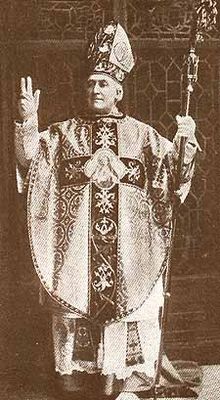Arnold Mathew

Arnold Harris Mathew (1852–1919) was the first Old Catholic bishop in the United Kingdom. He was a suspended Roman Catholic priest before joining the Old Catholic movement.
Mathew was appointed in 1908 after the Utrecht Union of Old Catholic Churches approved the establishment of a mission in the United Kingdom. Mathew convinced the continental Old Catholic prelates that he had a significant following in Britain which, in fact, was a rather small following. He was consecrated by Old Catholic Archbishop Gerardus Gul of Utrecht on April 28, 1908. Assisting Gul was Bishop J. J. Van Thiel of Haarlem, Bishop N. B. P. Spit of Deventer and Bishop J. Demmel of Bonn, Germany.
He then returned to England, formally establishing the Old Roman Catholic Church of Great Britain, which for a time was part of the Old Catholic Union of Utrecht, in opposition to the Roman Church in England. Mathew eventually raised a number of expelled priests to the episcopacy by himself, including two former Roman Catholic priests, Fathers Howarth and Beale, who had been excommunicated by the Roman Catholic Bishop of Nottingham for embezzling. Mathew then sent documents to Pope Pius X attesting to the episcopal consecrations. Upon receipt of these documents, Pope Pius X published the bull Cravi Iamdiu Scandalo in which he excommunicated Mathew and condemned him as a "pseudo-bishop" without authority and declared him vitandus, a term in church law which meant that Roman Catholics were subject to censure if they had anything to do with Mathew. Pius X also extended his sentence of excommunication to include those who had been consecrated by Bishop Mathew.
On December 29, 1910, Mathew declared his autonomy from the continental Old Catholics and their Union of Utrecht due to disagreements with certain practices and disciplines that Mathew felt deviated from Catholic tradition, such as the increasing tendency to discourage frequent auricular confession and veneration of relics and saints by continental Old Catholics.
Mathew later consecrated Prince Rudolph Edward de Landes Berghes, an Austrian formerly-Roman Catholic nobleman, in 1913 for apostolic work among Old Catholics (or: Old Roman Catholics) in Scotland.
In January 1916 he announced that he would be reconciled to the Holy See but changed his mind two months later, because the Holy See insisted he would only be reconciled as a layman and would be obliged to accept the doctrine of papal infallibility and primacy of the Roman Pontiff. He then sought union with the Church of England but the Anglican Archbishop of Canterbury refused to give Mathew any position as an Anglican clergyman. Mathew retired to a village in the English countryside and contented himself with assisting at services in an Anglican parish church as a layman.
By this time he had been deserted by his wife (he had married after his suspension as Roman Catholic priest) and had been abandoned by virtually all the priests and bishops he had ordained. He died suddenly in December 1919 and was buried as an Anglican layman. His episcopal seal and other documents disappeared after his death.

Mathew's activities as a bishop added to the coming into existence of the Liberal Catholic Church, founded by two Theosophical priests he consecrated to the episcopacy, and the more conservative Old Roman Catholic Churches, which are autocephalous churches holding to a Roman Catholic worship style, while rejecting the dogmas of the First Vatican Council (1869-1870) in several ways. Also, there are two sedevacantist "traditionalist" Catholic bishops, controversial Francis Schuckardt for example, whose orders are descended from Mathew's ordinations.
